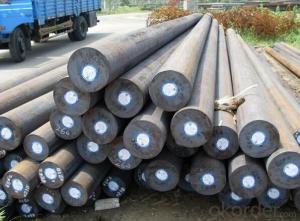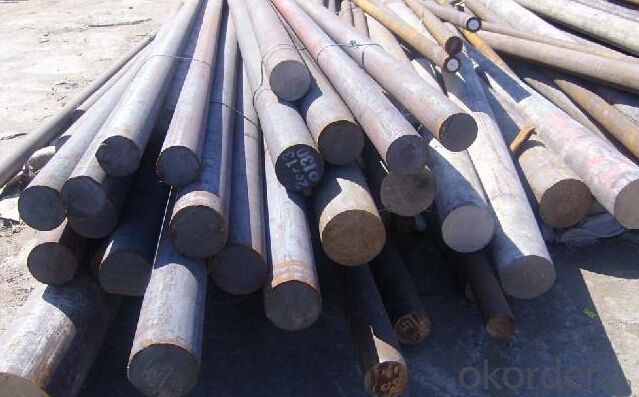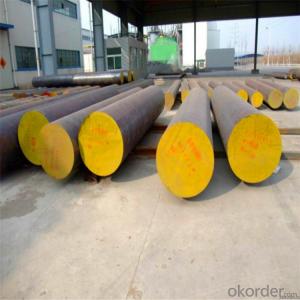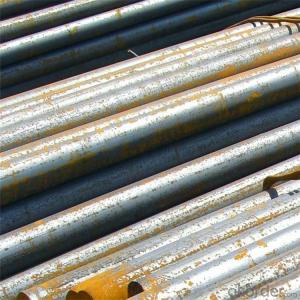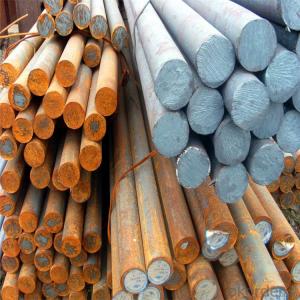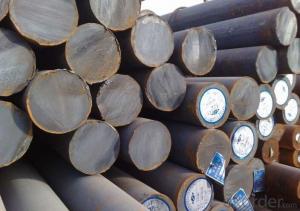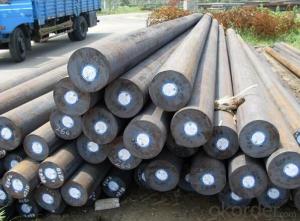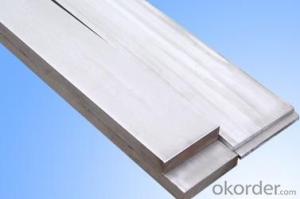Large Stock Grade S45C Mild steel round Bar Sizes
- Loading Port:
- Shanghai
- Payment Terms:
- TT OR LC
- Min Order Qty:
- 3 m.t.
- Supply Capability:
- 100000 m.t./month
OKorder Service Pledge
OKorder Financial Service
You Might Also Like
Specification
Large Stock Grade S45C Mild steel round Bar Sizes
Details Information of Large Stock Grade S45C Mild steel round Bar Sizes
| Name | SAE1045 Carbon Steel Round Bar |
| Shape | Round Bar/Square Bar/Flat Bar/Plate/Wire |
| Standard | GB/ASTM/SAE/AISI/DIN/JIS/EN/BS |
| Surface Treatment: | Black/Peeling/Polished/Machined |
| Delivery Condition: | Hot Rolled or Forged/Peeled or Black Surface |
| Test | SGS/UT 100% Elements Testing |
| Certificate: | ISO/Mill Certificate |
| Service: | 24 hours online service / |
| more than 20 years trading and manufacture | |
| Quality Assurance: | the third party inspection, such as SGS, BV, TUV…etc. is acceptable |
| Packaging Details: | Seaworthy Packaging or as per customer's packing instruction |
| Carbon structure round bar | Q195 Q235A Q235B 10# 20#-55# S45CB |
| Low alloy high strength round bar | Q345A/Q345C/Q345D Q345B Q345E |
| Alloy structure round bar | SAE51B20 20Cr 40Cr 40CrV 20CrMo/30CrMo/35CrMo/42CrMo 20CrMoA/30CrMoA/35CrMoA/42CrMoA/42Cr ML20CrMo/ML30CrMo/ML35CrMo/ML42CrMo B7/SCM435-440 20MnTiB 20CrMnMo 20CrMoH 42CrMoH 40MnB/40MnBH 30Mn2-40Mn2 27SiMn 50CrVA 30CrMnTi |
| Pinion steel | 20CrMnTi 20CrMnTiH 20CrMnTiHCS/20CrMnTiHLD Q20CrMnTi-1/Q20CrMnTi-2 |
| Sucker rod | 20-35CrMoA |
| Free-cutting steel | GT1215S |
| Spring steel | 60Si2MnA 65Mn |
| Ball bearing steel | GCr15 |
Chemical Composition of Large Stock Grade S45C Mild steel round Bar Sizes
| C | Si | Mn | P | S | Cr | Ni | Cu |
| 0.17-0.24 | 0.17-0.37 | 0.35-0.65 | ≤0.035 | ≤0.035 | ≤0.25 | ≤0.25 | ≤0.25 |
| Tensile strength (σb/MPa) | Yield strength (σb/MPa) | Elongation (δ5/%) |
| ≥410(42) | ≥245(25) | ≥25 |
Company Introduction of Large Stock Grade S45C Mild steel round Bar Sizes
CNBM International Corporation is the most import and export platform of CNBM group(China National Building Material Group Corporation) ,which is a state-owned enterprise, ranked in 270th of Fortune Global 500 in 2015.
With its advantages, CNBM International are mainly concentrate on Cement, Glass, Iron and Steel, Ceramics industries and devotes herself for supplying high quality series of refractories as well as technical consultancies and logistics solution.
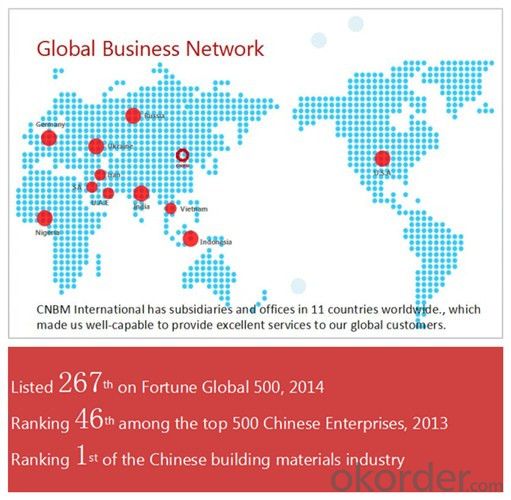
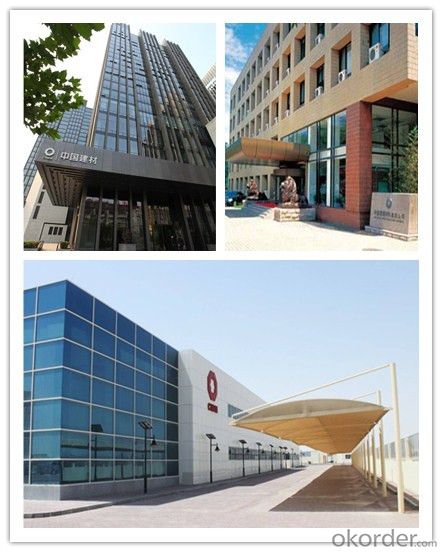
Certificates of Large Stock Grade S45C Mild steel round Bar Sizes
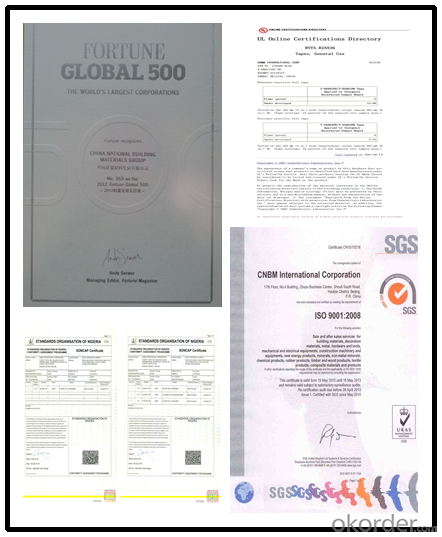
Packaging & Delivery of Large Stock Grade S45C Mild steel round Bar Sizes
Packaging Detail | Sea worthy packing /as per customer's packing instruction |
Delivery Detail | 15 ~ 40 days after receiving the deposit |
Products show of Large Stock Grade S45C Mild steel round Bar Sizes
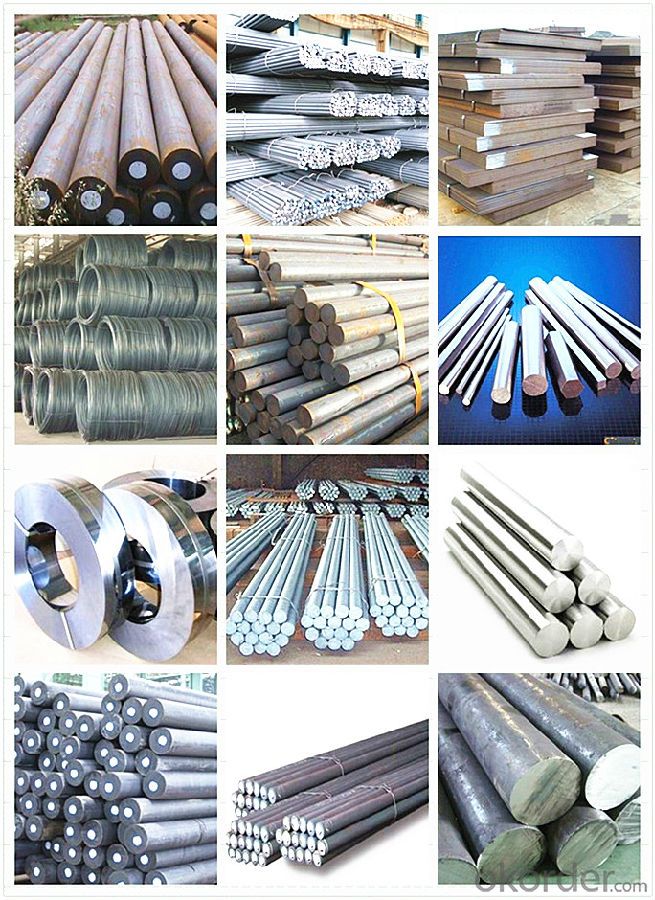
FAQ
Are you a trading company or manufacturer? | Manufacturer |
What’s the MOQ? | 3 metric ton |
What’s your delivery time? | 15-35 days after downpayment received |
Do you Accept OEM service? | Yes |
what’s your delivery terms? | FOB/CFR/CIF |
What's the Payment Terms? | 30% as deposit,70% before shipment by T/T |
Western Union acceptable for small amount. | |
L/C acceptable for large amount. | |
Scrow ,Paybal,Alipay are also ok | |
Why choose us? | Chose happens because of quality, then price, We can give you both. Additionally, we can also offer professional products inquiry, products knowledge train (for agents), smooth goods delivery, excellent customer solution proposals. |
What's your available port of Shipment? | Main Port, China |
What’s your featured services? | Our service formula: good quality+ good price+ good service=customer's trust
|
Where are your Market? | Covering more than 160 countries in the world |
- Q: What are the requirements for special steel used in pharmaceutical manufacturing?
- The requirements for special steel used in pharmaceutical manufacturing are quite stringent due to the critical nature of the industry. The special steel used in this sector must adhere to certain specifications and meet various requirements to ensure the safety, purity, and effectiveness of the pharmaceutical products being manufactured. First and foremost, the special steel used in pharmaceutical manufacturing must be of high quality and have excellent corrosion resistance. This is crucial to prevent any contamination or reaction with the pharmaceutical compounds or chemicals being processed. The steel must not release any impurities that could compromise the purity of the final product. Additionally, the special steel used in pharmaceutical manufacturing must be capable of withstanding high temperatures and pressures. Pharmaceutical manufacturing processes often involve heat treatment, sterilization, and other high-temperature operations. The steel must be able to endure these conditions without losing its structural integrity or affecting the quality of the pharmaceutical products. Another important requirement for special steel used in pharmaceutical manufacturing is easy cleanability. The steel must have a smooth surface that is free from any cracks, crevices, or rough areas that could trap bacteria, contaminants, or residues. This is essential for maintaining the hygiene and sterility of the manufacturing environment and ensuring that the pharmaceutical products meet the highest quality standards. Furthermore, the special steel used in pharmaceutical manufacturing must be compliant with regulatory standards and industry guidelines. It must meet the specific requirements set by regulatory bodies such as the Food and Drug Administration (FDA) or the European Medicines Agency (EMA). These standards often include specifications regarding the composition, mechanical properties, and traceability of the steel. In summary, the requirements for special steel used in pharmaceutical manufacturing are strict and encompass factors such as high quality, corrosion resistance, heat resistance, cleanability, and compliance with regulatory standards. Meeting these requirements is crucial to ensure the safety, purity, and effectiveness of the pharmaceutical products manufactured using this steel.
- Q: What are the different pharmaceutical grades of special steel?
- The pharmaceutical industry requires special steel grades that are designed and produced to meet strict requirements. These grades are used in equipment, instruments, and components that directly interact with pharmaceutical products. The different grades of special steel used in the pharmaceutical industry are as follows: 1. 316L Stainless Steel: This grade is widely used in pharmaceutical applications due to its exceptional corrosion resistance and high purity. It is commonly known as surgical stainless steel and is suitable for parts that need frequent cleaning and sterilization. 2. 304 Stainless Steel: This grade is also commonly used in the pharmaceutical industry because of its corrosion resistance and ease of fabrication. It is suitable for equipment and components that do not require frequent cleaning or sterilization. 3. Duplex Stainless Steel: This grade offers a combination of high strength and corrosion resistance, making it suitable for applications where durability and reliability are crucial. It is often used in pharmaceutical processing equipment that handles aggressive chemicals or high-pressure environments. 4. Hastelloy: Hastelloy is a nickel-based alloy that exhibits superior resistance to corrosion, heat, and chemicals. It is commonly used in pharmaceutical applications where extreme conditions are present, such as in reactors or vessels that handle highly corrosive substances. 5. Titanium: Although not technically steel, titanium is considered a pharmaceutical-grade material due to its excellent biocompatibility and corrosion resistance. It is used in medical implants and devices, as well as in pharmaceutical equipment that comes into contact with sensitive drugs. These special steel grades are carefully chosen based on their specific properties and suitability for pharmaceutical applications. They undergo manufacturing and testing processes to ensure compliance with industry standards and regulations, like Good Manufacturing Practices (GMP) and the United States Pharmacopeia (USP). Utilizing the appropriate steel grade in pharmaceutical manufacturing contributes to product safety, quality, and integrity.
- Q: What are the different forming techniques used for special steel?
- Some of the different forming techniques used for special steel include rolling, forging, extrusion, and casting.
- Q: How is special steel used in the production of conveyor belts?
- Special steel is used in the production of conveyor belts to enhance their durability, strength, and overall performance. Conveyor belts are commonly used in industries such as mining, manufacturing, food processing, and logistics to transport materials and goods. These belts are subjected to various demanding conditions, including heavy loads, high temperatures, and abrasive materials. Special steel alloys, such as stainless steel or heat-resistant steel, are used in specific parts of the conveyor belt to ensure its longevity and reliability. For example, stainless steel is often used in the wire mesh belts to prevent corrosion and rust, especially when the conveyor belt is exposed to moisture or chemicals. This helps to maintain the smooth and efficient movement of materials without contamination. Furthermore, special steel is employed in the manufacturing of belt fasteners, hinges, and other connecting components. These parts need to withstand significant tension, heat, and wear, and standard steel may not provide the necessary strength and durability. Special steel alloys can offer superior strength, resistance to high temperatures, and improved wear resistance, ensuring that the conveyor belt can function reliably even under demanding conditions. Moreover, in some applications where the conveyor belt is exposed to extreme temperatures, such as in steel mills or foundries, special heat-resistant steel is used. This steel can withstand the intense heat without deforming or losing its strength. It allows the conveyor belt to continue operating safely and efficiently in such extreme environments. In summary, special steel is essential in the production of conveyor belts as it enhances their durability, strength, and ability to withstand demanding conditions. Its use in wire mesh belts, fasteners, hinges, and heat-resistant components ensures the longevity and reliability of conveyor belts in various industries.
- Q: What are the properties of high-temperature alloy steel?
- High-temperature alloy steel possesses several key properties that make it suitable for use in high-temperature environments. These properties include excellent strength and toughness, good resistance to oxidation and corrosion, high creep resistance (ability to withstand gradual deformation under stress at elevated temperatures), and thermal stability. Additionally, high-temperature alloy steel often exhibits good thermal conductivity and low thermal expansion, allowing it to maintain its shape and mechanical properties even at extreme temperatures.
- Q: How is special steel used in the marine supply chain?
- Special steel is used extensively in the marine supply chain due to its exceptional strength, corrosion resistance, and durability. It is utilized in the construction of various marine components such as ship hulls, propeller shafts, offshore platforms, and marine equipment. Special steel ensures the structural integrity and longevity of these critical marine structures, enabling safe and efficient operations in harsh and corrosive marine environments.
- Q: What is the difference between special steel and regular steel?
- Special steel refers to a specific type of steel that is designed and manufactured to possess enhanced properties compared to regular steel. These enhanced properties can include higher strength, improved corrosion resistance, better heat resistance, or increased hardness. Special steel is often used in applications where standard steel may not meet the required specifications or performance demands.
- Q: How does special steel withstand extreme temperatures?
- Special steel is able to withstand extreme temperatures due to its unique composition and production process. One key factor is the addition of alloying elements such as chromium, molybdenum, and nickel, which enhance the steel's heat resistance. These elements form stable oxides on the surface of the steel, creating a protective barrier against oxidation and corrosion at high temperatures. Furthermore, special steel undergoes specialized heat treatment methods like quenching and tempering, which refine its microstructure and improve its mechanical properties. This process enhances the steel's ability to maintain its strength and hardness even when exposed to extreme temperatures. Additionally, the manufacturing process of special steel involves precision and control over the cooling rate during its production. This controlled cooling prevents the formation of brittle phases, ensuring that the steel retains its toughness and ductility at both high and low temperatures. Moreover, the grain size of special steel is carefully controlled through techniques like grain refinement, which leads to a more homogeneous and fine-grained microstructure. This fine-grained structure enhances the steel's resistance to thermal fatigue and creep, allowing it to withstand prolonged exposure to extreme temperatures without significant degradation. Overall, the combination of alloying elements, specialized heat treatment processes, controlled cooling, and refined microstructure makes special steel highly capable of withstanding extreme temperatures while maintaining its structural integrity and mechanical properties.
- Q: What are the different wear-resistant grades of special steel?
- In the market, one can find various grades of special steel that are resistant to wear. Each grade has its own unique properties and applications. Some commonly used grades include: 1. D2 Steel: This grade is known for its high resistance to wear and its exceptional toughness. It is often utilized in the manufacturing of cutting tools, punches, and dies. 2. M2 Steel: M2 steel is a type of high-speed steel that exhibits remarkable resistance to wear and heat. It is commonly employed in the production of drill bits, milling cutters, and other tools that require high hardness and wear resistance. 3. A2 Steel: A2 steel is a versatile grade known for its excellent resistance to wear and toughness. It is frequently utilized in the manufacturing of cold work tools, such as blanking dies and gauges. 4. O1 Steel: O1 steel is an oil-hardening tool steel that possesses good wear resistance and dimensional stability. It is commonly used in the production of blades, punches, and other cutting tools. 5. S7 Steel: S7 steel is a grade that is highly resistant to shock and wear. It is often employed in the manufacturing of chisels, shear blades, and other tools that require resistance to impact and wear. 6. AR400 Steel: AR400 steel is a specific type of abrasion-resistant steel that has a hardness of approximately 400 Brinell. It is frequently utilized in heavy-duty applications such as mining equipment, bulldozer blades, and dump truck bodies. These examples merely scratch the surface of the various wear-resistant grades of special steel available in the market. The choice of grade depends on the specific requirements of the application, including the type and intensity of wear, operating conditions, and desired hardness. Seeking advice from a steel supplier or expert can aid in selecting the most suitable grade for a particular application.
- Q: How does nitriding steel improve hardness and wear resistance?
- Nitriding steel improves hardness and wear resistance by introducing nitrogen into the surface of the steel, forming a hard nitride layer. This layer increases the surface hardness of the steel, making it more resistant to wear, friction, and scratching. Additionally, the nitride layer also provides improved resistance against corrosion and high-temperature oxidation.
Send your message to us
Large Stock Grade S45C Mild steel round Bar Sizes
- Loading Port:
- Shanghai
- Payment Terms:
- TT OR LC
- Min Order Qty:
- 3 m.t.
- Supply Capability:
- 100000 m.t./month
OKorder Service Pledge
OKorder Financial Service
Similar products
Hot products
Hot Searches
Related keywords
